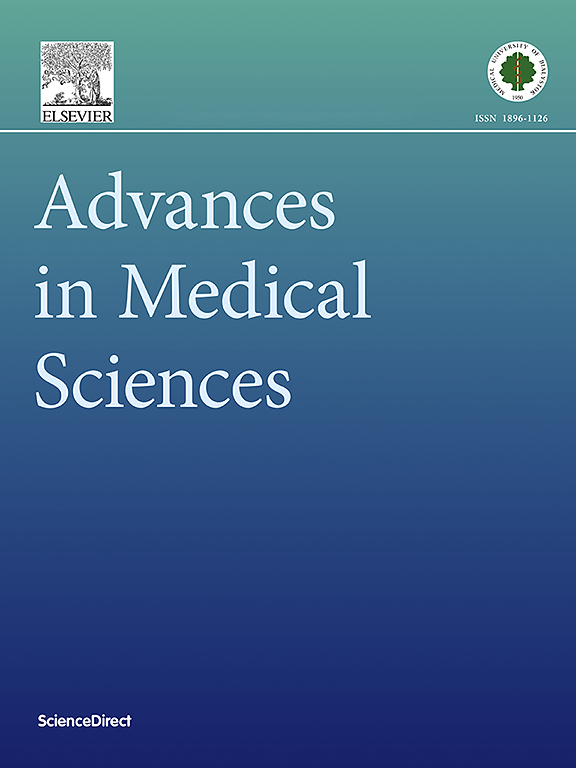Investigation of circulating natural autoantibodies against ANXA1 and MYC as potential biomarkers in hepatocellular carcinoma
IF 2.6
4区 医学
Q3 MEDICINE, RESEARCH & EXPERIMENTAL
引用次数: 0
Abstract
Purpose
In this study, we examined novel autoantibodies targeting tumor-associated antigens (TAAs) as biomarkers for clinical assessment of hepatocellular carcinoma (HCC) in a Chinese population.
Methods and methods
A total of 119 patients with HCC and 130 healthy control (HC) volunteers who were age and gender matched were enrolled. The levels of circulating IgG antibodies were detected using an enzyme-linked immunosorbent test (ELISA) developed in-house with linear peptide antigens derived from Annexin A1(ANXA1) and proto-oncogene protein (MYC). The significant level was set at P < 0.025 as two tests were performed.
Results
In comparison to the HC group, plasma level of ANXA1 autoantibodies was significantly elevated in HCC patients (t = −3.174, P = 0.002) but the change of plasma MYC autoantibody levels failed to reach the significance level (P > 0.025). There was a significant increase in these two plasma IgG autoantibodies in male HCC patients (ANXA1: t = −3.590, P < 0.001; MYC: t = −2.706, P = 0.007). Pearson correlation analysis demonstrated that both anti-ANXA1 and anti-MYC IgG levels had a positive correlation with BCLC staging (both P < 0.025) but a negative correlation with plasma albumin (Alb) (both P < 0.025). The area under the ROC curve (AUC) values were 0.613 for anti-ANXA1 IgG assay and 0.567 for anti-MYC IgG assay. The anti-ANAXA1 IgG assay showed a high sensitivity of 31.4 % against the specificity of 90.0 % for detection of BCLC stages C + D.
Conclusions
Plasma anti-ANXA1 and anti-MYC autoantibodies are likely to serve as a potential biomarker for clinical assessment of HCC prognosis, particularly in male patients.
抗ANXA1和MYC的循环天然自身抗体作为肝细胞癌潜在生物标志物的研究。
目的:在这项研究中,我们检测了靶向肿瘤相关抗原(TAAs)的新型自身抗体作为中国人群肝细胞癌(HCC)临床评估的生物标志物。方法和方法:共纳入119例HCC患者和130例年龄和性别匹配的健康对照(HC)志愿者。采用酶联免疫吸附试验(ELISA)检测循环IgG抗体水平,该试验采用源自膜联蛋白A1(ANXA1)和原癌基因蛋白(MYC)的线性肽抗原。结果:HCC患者血浆中ANXA1自身抗体水平较HC组显著升高(t=-3.174, P = 0.002),而MYC自身抗体水平变化未达到显著水平(P = 0.025)。在男性HCC患者中,这两种血浆IgG自身抗体显著升高(ANXA1: t=-3.590, p)。结论:血浆抗ANXA1和抗myc自身抗体可能作为HCC临床预后评估的潜在生物标志物,尤其是在男性患者中。
本文章由计算机程序翻译,如有差异,请以英文原文为准。
求助全文
约1分钟内获得全文
求助全文
来源期刊

Advances in medical sciences
医学-医学:研究与实验
CiteScore
5.00
自引率
0.00%
发文量
53
审稿时长
25 days
期刊介绍:
Advances in Medical Sciences is an international, peer-reviewed journal that welcomes original research articles and reviews on current advances in life sciences, preclinical and clinical medicine, and related disciplines.
The Journal’s primary aim is to make every effort to contribute to progress in medical sciences. The strive is to bridge laboratory and clinical settings with cutting edge research findings and new developments.
Advances in Medical Sciences publishes articles which bring novel insights into diagnostic and molecular imaging, offering essential prior knowledge for diagnosis and treatment indispensable in all areas of medical sciences. It also publishes articles on pathological sciences giving foundation knowledge on the overall study of human diseases. Through its publications Advances in Medical Sciences also stresses the importance of pharmaceutical sciences as a rapidly and ever expanding area of research on drug design, development, action and evaluation contributing significantly to a variety of scientific disciplines.
The journal welcomes submissions from the following disciplines:
General and internal medicine,
Cancer research,
Genetics,
Endocrinology,
Gastroenterology,
Cardiology and Cardiovascular Medicine,
Immunology and Allergy,
Pathology and Forensic Medicine,
Cell and molecular Biology,
Haematology,
Biochemistry,
Clinical and Experimental Pathology.
 求助内容:
求助内容: 应助结果提醒方式:
应助结果提醒方式:


